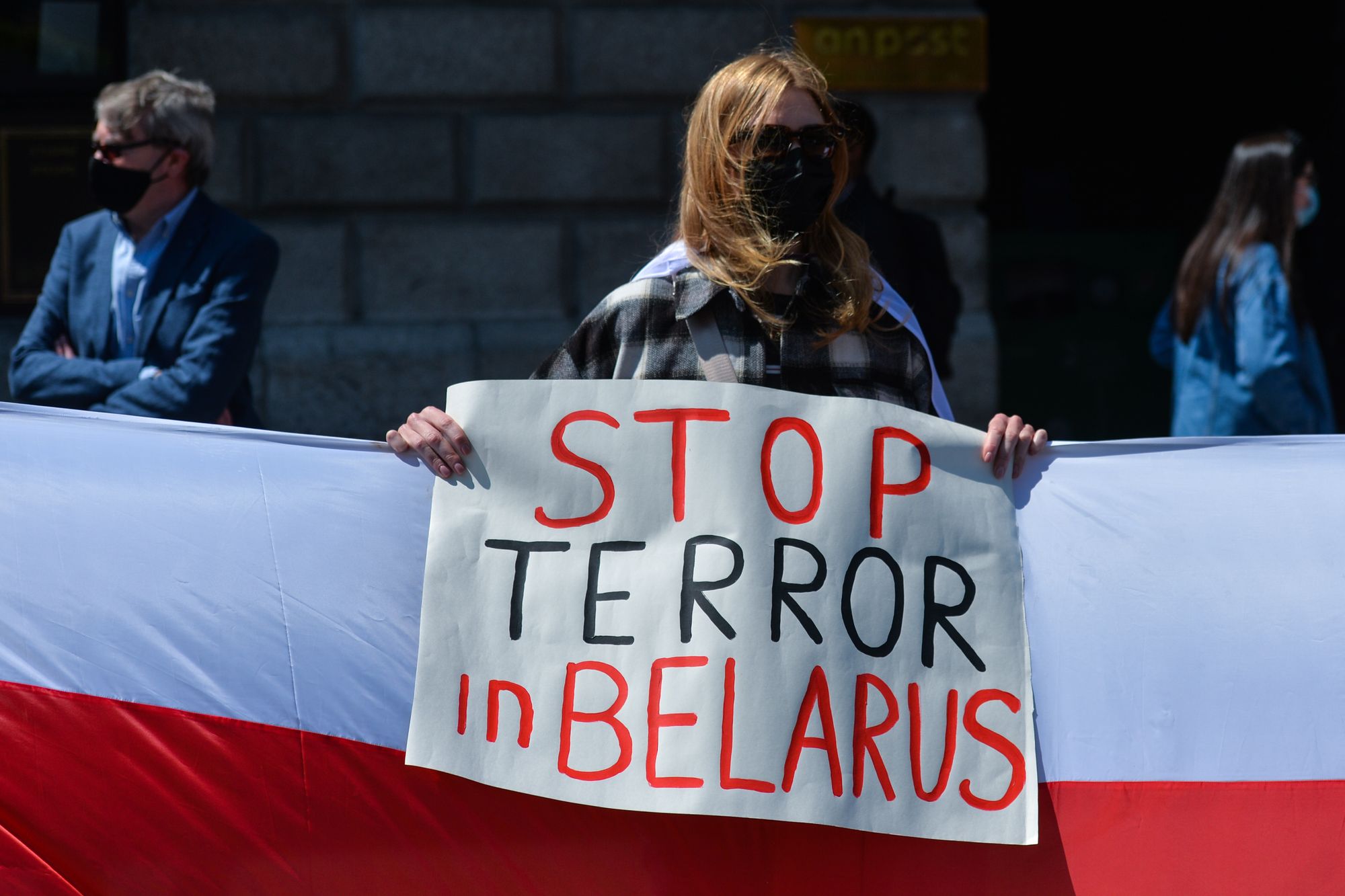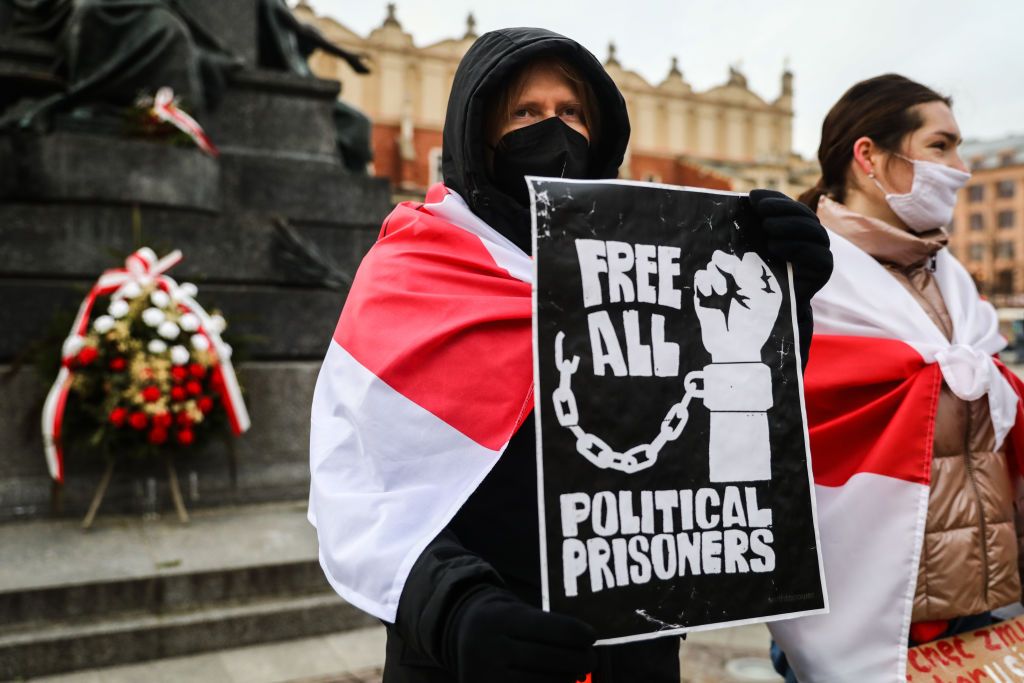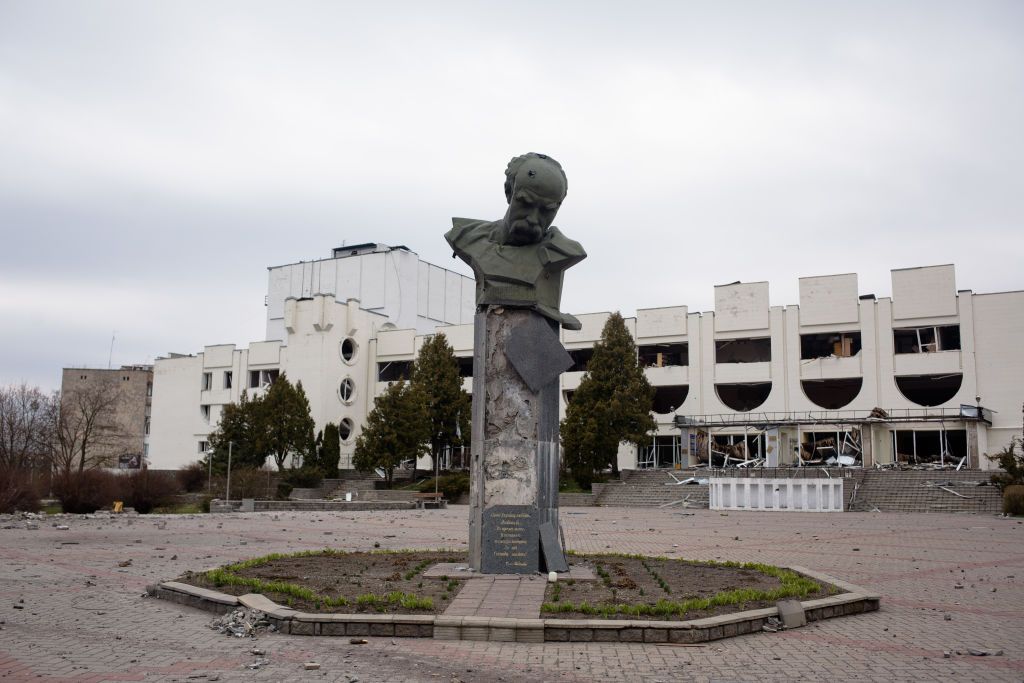New Belarusian poetry collection explores revolution, exile, war

When Belarusian author Hanna Komar brought the manuscript for her poetry collection “Ribwort” to a publisher in Belarus in the summer of 2021, she was told that their business would be shut down if they published her work.
Komar, like thousands of her fellow Belarusians, took part in the 2020-2021 protests against Belarusian dictator Aleksandr Lukashenko and was even briefly jailed. She later went into exile, resettling in the U.K.
“Some call (it) ‘the awakening of Belarusians’; others call it ‘the birth of a new, free Belarus.’ Whatever it’s called, these years have felt, for the nation and for me personally, like a process of unlearning our learned helplessness,” Komar writes in the introduction to the English version of “Ribwort,” now available from the U.K. publisher 3TimesRebel Press.
The title of Komar’s poetry collection comes from the ribwort plant, which is found in Belarus and can be used as a natural histamine. Komar, through her poignantly crafted verses, endeavors to ease the pain inflicted upon her and her fellow Belarusians by outside forces and from within the country itself.
The 2020-2021 protests are at the heart of the poetry collection, although not every poem is dedicated to this tumultuous yet hopeful period. It marked a turning point in the country’s recent history, where Belarusians tried to push for a more democratic and independent future. As Komar writes:
in the smoke
from your stun grenades we can’t see
where to run
the past running up with shields against our flags
A country of around 10 million people with its own diverse history and culture, Belarus has long existed in Russia’s authoritarian shadow. Efforts to embrace the Belarusian language at the state level during the years of the country’s nascent independence from the Soviet Union were stifled by Lukashenko, who has ruled with the backing of the Kremlin in neighboring Russia.
Lukashenko leveraged a power dynamic rooted in the Soviet era, where Russian culture served as a source of “authority.” The Soviets deliberately elevated the Russian language and culture in education, work, and public life, aiming to create an illusion of "brotherly nations." However, the underlying purpose of this was to suppress any sense of national identity. Belarusian cultural figures, much like their counterparts in Soviet Ukraine, faced oppression and persecution during the 1930s — a somber reality referenced by Komar in her poetry:
If it was 1937
they’d execute me as well
for I indulged my vowels
and forgave my consonants,
didn’t create new social units but poems
During Lukashenko’s nearly 30 years in power, Belarusians have witnessed a steady decline in civil liberties and human rights. Lukashenko became president following the 1994 presidential election, which the U.S. non-profit organization Freedom House describes as “the country’s only democratic (one).”
Sviatlana Tsikhanouskaya put forward her candidacy for the 2020 presidential election in place of her husband, the opposition blogger Syarhei Tsikhanousky, after he was arrested and jailed. She went on to become Lukashnko’s leading contender, and that election year marked an unprecedented voter turnout.
Tsikhanouskaya’s platform called for the release of political prisoners, constitutional limitations on the presidential terms, and free and fair elections. After Lukashenko declared “victory,” Tsikhanouskaya herself was briefly detained by the authorities and then forced into exile.
Belarusians went out en masse to protest the unjust outcome of the election for 10 months. Based on data collected by the Voice Platform, the Zubr Platform, and the Honest People Initiative, there was no way that Lukashenko could have won 80% of the vote, as he claimed. The NGOs also recorded falsifications at over 400 polling places nationwide.
According to the international NGO Reporters Without Borders, repressions have only increased since Lukashenko declared his fraudulent presidential “victory.” Nearly 1,500 Belarusians are currently recognized by the Viasna Human Rights Center as political prisoners.
In her poetry, Komar underscores the urgency of the protests and how every Belarusian, regardless of their background, had an essential role in their outcome. Rather than be passive victims, they had to become active citizens:
when we are attacked
by a horde of black batons when our wings are broken against the blind
force of water cannons what should i do
beg them to stop
or run away?
This embrace of civic-mindedness came at a considerable cost. Komar was imprisoned for nine days for her participation in the protests and witnessed firsthand the abject cruelty of Lukashenko’s authoritarian state. She recounts how the prison guards would not only subject prisoners to physical but psychological torture, trying to demoralize them in every possible way:
his blood pooled beneath my feet...
they liked that i had to watch
so i turned away
You like that, bitch?
We’ll pass you around
Or shove a bottle up you
Belarusians continued to protest despite these threats, although many of them were eventually left with no choice but to go into exile. Yet, the work of the Belarusian opposition continues even outside the country.
One particularly commendable aspect of the collection, beyond Komar’s bravery, is the lucidity of her verses, namely her ability to situate Belarusians’ struggle in the greater context of all the ongoing conflicts and war in the region.
It stands in stark contrast to the more prominent members of the Russian exile community, who have used their platforms in the western media to make repeated declarations about how “(Russian writer Fyodor) Dostoevsky is not at fault” for the Russian invasion of Ukraine (stoking fears of growing censorship against the so-called “great Russian culture”) or complaining about statues to the Russian poet Alexander Pushkin being dismantled across Ukraine.
Komar acknowledges that she and other Belarusians forced into exile do not have to deal with an onslaught of Russian missile and drone attacks as those in Ukraine have had to do for nearly two years.
As much as Belarusians are struggling, they understand that they are more “well-off” than Ukrainians:
it’s a privilege
not to have to
tape up my window
from flying glass
of air raids
no one is bombarding this city
Komar also keeps in contact with her friends inside Ukraine during this time, chronicling how the war has changed their perspectives on life. For example, she includes fragments from their Facebook posts and Telegram messages during the early weeks of the full-scale Russian invasion that convey how easily familiar, everyday sounds can be mistaken for harbingers of death.
Yet those in Ukraine have remained defiant, and the social media fragments form their own unique kind of poem, a collage of resistance:
First I used to freak out about every tiny knock on the door, now
I freak out about the sound
of suitcase wheels, because
it resembles a flying bomber. What a life,
a blockbuster. But I can still laugh about it, which means we’ll survive.
Komar and other Belarusians cannot help but be emotionally invested in the horrors unfolding on a daily basis back in their home country as well as in neighboring war-torn Ukraine. The initial momentum of the 2020-2021 protests may have subsided, but if there is any hope left for a better future, they cannot simply accept what fate has handed them.
Almost four years have elapsed since then, yet Lukashenko continues to hold power in Belarus. Despite the daunting challenges ahead for the Belarusian opposition, Komar, in one of her poems, eloquently captures the changing seasons, alluding to the reality that even Lukashenko's regime cannot endure indefinitely:
Water cannons prepare to wash away
sandbags on the barricades of our summer;
the lifebuoy ring is damaged, but then
so are the wheels of the cannons

In addition to writing about the 2020-2021 Belarusian opposition protests and Russia’s all-out war against Ukraine, Komar addresses more “mainstream” social issues faced by young women like herself in Belarus, namely sexism. By comparison, it seems almost lighthearted in nature, yet they are no less of a burden on one’s soul:
“You need to get married,”
a woman on the train
believes as ferociously
as she holds her plastic flowers for the graves in April
“Ribwort” is a multi-layered poetry collection from one of Belarus’ most promising young literary talents. Komar’s verses are defined by bravery, honesty, and most importantly, empathy. Although infused with righteous indignation, there's a discernible intent behind her emotions: she advocates for channeling these feelings into something constructive and meaningful rather than allowing them to corrode her spirit or that of her fellow countrymen and women.
Note from the author:
Hi, this is Kate Tsurkan, thanks for reading this article. Since the start of Russia's full-scale invasion of Ukraine, there's been a lot of talk about Ukraine's cultural revival. However, Belarusians and people from other neighboring countries are reckoning with years of Russian colonialism as well. Culture has taken on an even more important meaning during wartime and if you like reading about this sort of thing, please consider supporting our reporting.













